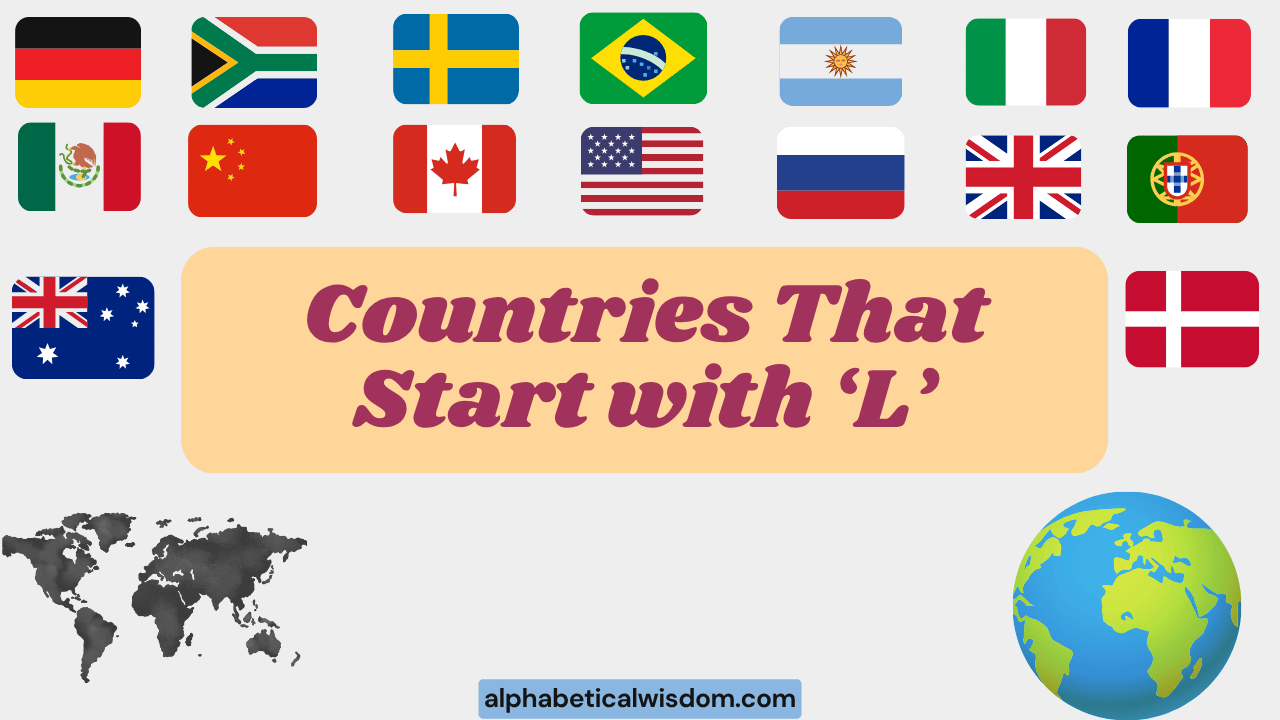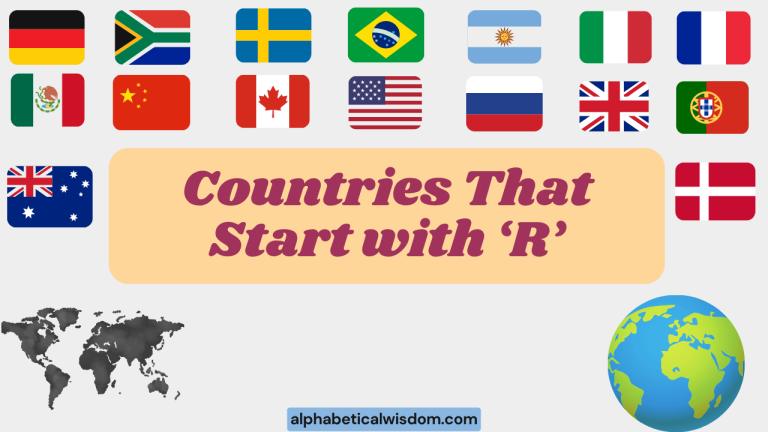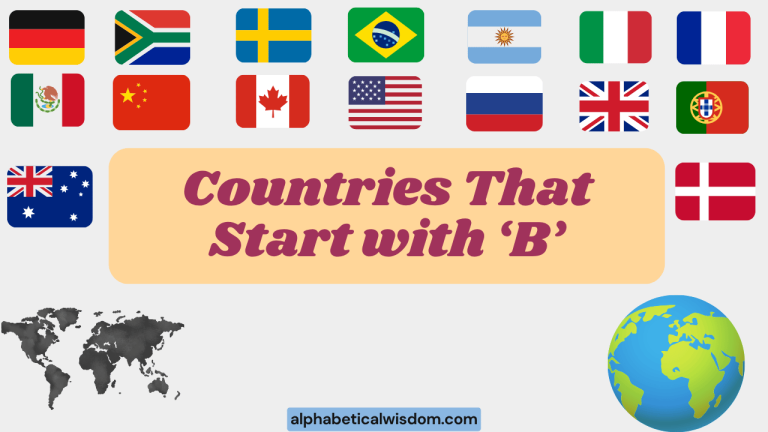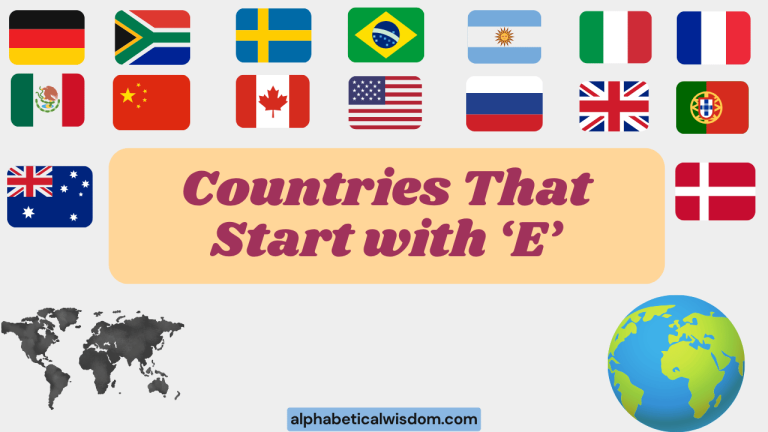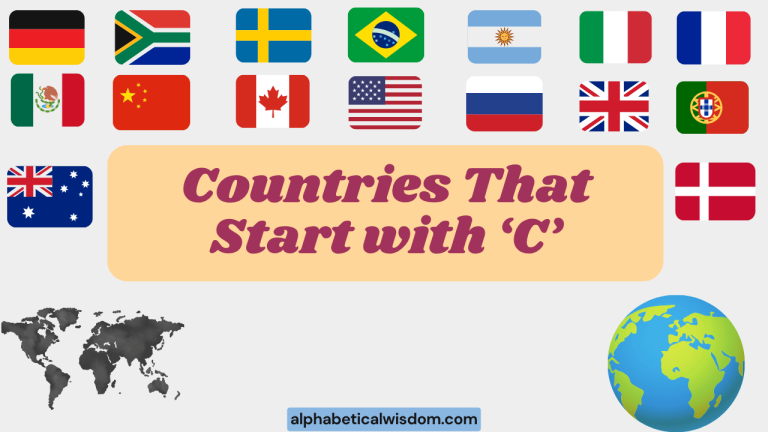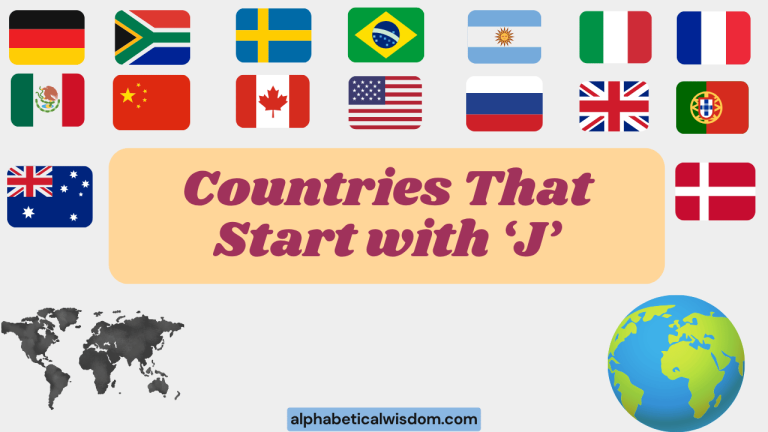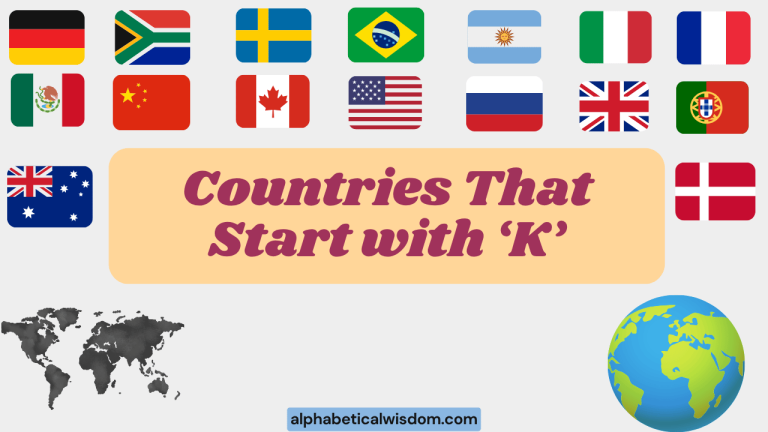Countries Starting With L: A Comprehensive Grammar Guide
Understanding how to correctly use country names, especially those starting with specific letters like “L,” is crucial for clear and accurate communication in English. This article provides a detailed exploration of the grammar rules and conventions associated with countries beginning with “L,” covering everything from basic usage to more advanced considerations.
Whether you’re an English language learner, a student, or simply someone looking to improve their grammar skills, this guide will equip you with the knowledge and confidence to use these country names correctly in both written and spoken English.
This comprehensive guide is designed to help learners of all levels, from beginners to advanced speakers, master the nuances of using country names that start with the letter “L.” By understanding the rules, exceptions, and common mistakes, you can enhance your overall fluency and accuracy in English.
Table of Contents
- Introduction
- Definition: Countries Starting with L
- Structural Breakdown
- Types and Categories
- Examples of Countries Starting with L
- General Usage Examples
- Examples in Sentences
- Examples with Adjectives
- Examples with Prepositions
- Examples with Verbs
- Usage Rules
- Common Mistakes
- Practice Exercises
- Advanced Topics
- FAQ
- Conclusion
Definition: Countries Starting with L
A country is a self-governing political entity. For our purposes, we are focusing on countries whose names, in English, begin with the letter “L.” These include, but are not limited to, Laos, Latvia, Lebanon, Lesotho, Liberia, Libya, Liechtenstein, Lithuania, and Luxembourg.
Understanding these names and their associated grammatical rules is essential for accurate and effective communication.
The grammatical importance lies in using the correct articles, adjectives, and possessive forms when referring to these countries. Each country has specific rules and conventions that must be followed to ensure clarity and avoid miscommunication.
Furthermore, understanding the historical and cultural contexts associated with these countries can enrich your language skills and demonstrate a deeper understanding of global affairs.
Structural Breakdown
The structure of using country names in English typically involves the following elements:
- The country name itself: This is the basic identifier, such as “Laos” or “Latvia.”
- Articles (optional): Some country names require the definite article “the,” while others do not. For example, “the United States” vs. “Canada.” None of the countries starting with L require the use of “the”.
- Adjectives (to describe nationality): These are derived from the country name and used to describe people, culture, or products from that country. For example, “Lao” (from Laos), “Latvian” (from Latvia).
- Prepositions (to indicate location or origin): Common prepositions used with country names include “in,” “from,” “to,” and “of.”
- Verbs (to describe actions or states): Verbs are used to describe actions or states related to the country, such as “travel to,” “live in,” or “come from.”
Understanding how these elements interact is crucial for constructing grammatically correct and meaningful sentences. The specific rules for each country may vary, so it’s important to pay attention to the details.
Types and Categories
Countries starting with “L” can be categorized based on various factors, including their geographical location, political system, and cultural characteristics. However, from a grammatical perspective, the primary focus is on how these names are used in sentences and the associated rules.
- Geographical Location: This categorization groups countries based on their continent or region, such as Southeast Asia (Laos), Europe (Latvia, Lithuania, Liechtenstein, Luxembourg), Africa (Lesotho, Liberia, Libya), and the Middle East (Lebanon).
- Political System: Countries can be classified as republics, monarchies, or other forms of government, which may influence the formal language used when referring to them.
- Cultural Characteristics: Each country has its unique culture, language, and traditions, which can be reflected in the way they are discussed in English.
Examples of Countries Starting with L
This section provides extensive examples of how countries starting with “L” are used in various contexts. These examples are categorized to illustrate different aspects of grammar and usage.
General Usage Examples
The following table provides general examples of using countries starting with “L” in simple sentences. These examples illustrate the basic structure and common patterns.
| Country | Example Sentence |
|---|---|
| Laos | Laos is a landlocked country in Southeast Asia. |
| Latvia | Latvia is one of the Baltic states. |
| Lebanon | Lebanon is a country in the Middle East with a rich history. |
| Lesotho | Lesotho is a mountainous kingdom surrounded by South Africa. |
| Liberia | Liberia was founded by freed American slaves. |
| Libya | Libya is a country in North Africa. |
| Liechtenstein | Liechtenstein is a small principality in the Alps. |
| Lithuania | Lithuania is the largest of the Baltic states. |
| Luxembourg | Luxembourg is a small country in Western Europe. |
| Laos | The capital of Laos is Vientiane. |
| Latvia | Riga is the largest city in Latvia. |
| Lebanon | Beirut is the capital of Lebanon. |
| Lesotho | Maseru is the capital city of Lesotho. |
| Liberia | Monrovia is the capital of Liberia. |
| Libya | Tripoli is the capital of Libya. |
| Liechtenstein | Vaduz is the capital of Liechtenstein. |
| Lithuania | Vilnius is the capital of Lithuania. |
| Luxembourg | Luxembourg City is the capital of Luxembourg. |
| Laos | Many people visit Laos to see its beautiful temples. |
| Latvia | Latvia is known for its Art Nouveau architecture. |
| Lebanon | Lebanon has a diverse cultural heritage. |
| Lesotho | Lesotho’s economy is heavily reliant on South Africa. |
| Liberia | Liberia is working to rebuild its infrastructure. |
| Libya | Libya has significant oil reserves. |
| Liechtenstein | Liechtenstein is a popular destination for skiing. |
| Lithuania | Lithuania has a strong tradition of basketball. |
| Luxembourg | Luxembourg is one of the wealthiest countries in the world. |
Examples in Sentences
This table provides more complex sentence examples to show how these country names can be used in various contexts within a sentence.
| Country | Example Sentence |
|---|---|
| Laos | Traveling through Laos, I was struck by the serene beauty of its landscapes and the warmth of its people. |
| Latvia | The history of Latvia is intricately linked to its neighboring Baltic countries and its struggle for independence. |
| Lebanon | Despite its turbulent past, Lebanon remains a vibrant cultural hub with a unique blend of Eastern and Western influences. |
| Lesotho | The economy of Lesotho is heavily dependent on South Africa, which surrounds it completely. |
| Liberia | After years of civil war, Liberia is slowly rebuilding its infrastructure and working towards stability. |
| Libya | The political situation in Libya remains unstable following the overthrow of its long-time leader. |
| Liechtenstein | Liechtenstein’s low tax rates and stable economy make it an attractive destination for international businesses. |
| Lithuania | Lithuania’s membership in the European Union has brought significant economic and social changes to the country. |
| Luxembourg | Luxembourg’s strategic location in the heart of Europe has made it a key player in international finance. |
| Laos | The Mekong River is vital to the economy and transportation in Laos. |
| Latvia | Many tourists visit Latvia to explore its medieval castles and charming towns. |
| Lebanon | The cuisine of Lebanon is famous for its delicious mezze and grilled meats. |
| Lesotho | The high altitude of Lesotho makes it a popular destination for hikers and nature enthusiasts. |
| Liberia | The government of Liberia is working to improve education and healthcare for its citizens. |
| Libya | The discovery of oil in Libya has significantly impacted its economy and political landscape. |
| Liechtenstein | The people of Liechtenstein enjoy a high standard of living and a strong sense of community. |
| Lithuania | The traditional folk music and dances of Lithuania are an important part of its cultural heritage. |
| Luxembourg | The multilingual environment in Luxembourg reflects its diverse population and international connections. |
| Laos | I plan to visit Laos next year to experience its rich culture and stunning natural beauty. |
| Latvia | She studied abroad in Latvia and fell in love with the country’s unique blend of history and modernity. |
| Lebanon | He is originally from Lebanon but has lived in the United States for many years. |
| Lesotho | They traveled to Lesotho to volunteer with a local community development project. |
| Liberia | The organization is working to provide clean water and sanitation in Liberia. |
| Libya | The news reported on the ongoing political unrest in Libya. |
| Liechtenstein | My friend works for a financial institution based in Liechtenstein. |
| Lithuania | The conference on renewable energy will be held in Lithuania. |
| Luxembourg | The company has its European headquarters in Luxembourg. |
Examples with Adjectives
This table focuses on the use of adjectives derived from the country names, illustrating how they modify nouns to describe nationality or origin.
| Country | Adjective | Example Sentence |
|---|---|---|
| Laos | Lao | The Lao people are known for their hospitality. |
| Latvia | Latvian | She speaks fluent Latvian. |
| Lebanon | Lebanese | We enjoyed a delicious Lebanese meal. |
| Lesotho | Basotho | Basotho blankets are a traditional craft. |
| Liberia | Liberian | He is a Liberian citizen. |
| Libya | Libyan | The Libyan desert covers much of the country. |
| Liechtenstein | Liechtensteiner | The Liechtensteiner economy is very stable. |
| Lithuania | Lithuanian | Lithuanian cuisine includes many potato dishes. |
| Luxembourg | Luxembourgish | Luxembourgish is one of the official languages of the country. |
| Laos | Lao | We tried Lao coffee at the market. |
| Latvia | Latvian | The Latvian flag is red and white. |
| Lebanon | Lebanese | Lebanese music is very popular in the Middle East. |
| Lesotho | Basotho | The Basotho culture is rich in traditions. |
| Liberia | Liberian | The Liberian government is working to improve its economy. |
| Libya | Libyan | The Libyan oil industry is a major source of revenue. |
| Liechtenstein | Liechtensteiner | The Liechtensteiner Alps are beautiful. |
| Lithuania | Lithuanian | Lithuanian amber is highly valued. |
| Luxembourg | Luxembourgish | Luxembourgish traditions are unique. |
| Laos | Lao | She is learning the Lao language. |
| Latvia | Latvian | He is a Latvian artist. |
| Lebanon | Lebanese | They are opening a Lebanese restaurant. |
| Lesotho | Basotho | We admired the Basotho craftsmanship. |
| Liberia | Liberian | The Liberian president gave a speech. |
| Libya | Libyan | The Libyan government is working on peace. |
| Liechtenstein | Liechtensteiner | The Liechtensteiner people are very friendly. |
| Lithuania | Lithuanian | The Lithuanian national team won. |
| Luxembourg | Luxembourgish | The Luxembourgish language is related to German. |
Examples with Prepositions
This table illustrates the use of prepositions with country names, showing how they indicate location, direction, or relationship.
| Country | Example Sentence |
|---|---|
| Laos | She lives in Laos. |
| Latvia | He is from Latvia. |
| Lebanon | They traveled to Lebanon. |
| Lesotho | The project is based in Lesotho. |
| Liberia | Aid is being sent to Liberia. |
| Libya | There are oil fields in Libya. |
| Liechtenstein | She works in Liechtenstein. |
| Lithuania | He is visiting Lithuania. |
| Luxembourg | They are moving to Luxembourg. |
| Laos | She flew from Thailand to Laos. |
| Latvia | The conference was held in Latvia. |
| Lebanon | He returned to Lebanon after many years abroad. |
| Lesotho | The organization provides support in Lesotho. |
| Liberia | She is volunteering in Liberia. |
| Libya | There is much political turmoil in Libya. |
| Liechtenstein | He invested in a company in Liechtenstein. |
| Lithuania | The event took place in Lithuania. |
| Luxembourg | She is studying in Luxembourg. |
| Laos | He is interested in the culture of Laos. |
| Latvia | She is proud of her heritage from Latvia. |
| Lebanon | He has many friends in Lebanon. |
| Lesotho | They are committed to helping the people of Lesotho. |
| Liberia | She is dedicated to improving the lives of people in Liberia. |
| Libya | He is following the news from Libya closely. |
| Liechtenstein | They are impressed by the stability of Liechtenstein. |
| Lithuania | She is fascinated by the history of Lithuania. |
| Luxembourg | They admire the diversity of Luxembourg. |
Examples with Verbs
This table demonstrates the use of verbs with country names, showing how they describe actions or states related to the country.
| Country | Example Sentence |
|---|---|
| Laos | He visited Laos last year. |
| Latvia | She explored Latvia’s capital city. |
| Lebanon | They are planning to travel to Lebanon. |
| Lesotho | We hiked in Lesotho’s mountains. |
| Liberia | Aid organizations assist Liberia. |
| Libya | Oil companies operate in Libya. |
| Liechtenstein | Many banks are located in Liechtenstein. |
| Lithuania | Tourists often visit Lithuania. |
| Luxembourg | Businesses invest in Luxembourg. |
| Laos | The country of Laos borders Thailand. |
| Latvia | Latvia gained independence in 1991. |
| Lebanon | Lebanon struggles with political instability. |
| Lesotho | Lesotho relies on South Africa for economic support. |
| Liberia | Liberia recovered from civil war. |
| Libya | Libya exports oil. |
| Liechtenstein | Liechtenstein attracts international investors. |
| Lithuania | Lithuania joined the European Union. |
| Luxembourg | Luxembourg prospers as a financial center. |
| Laos | I want to learn more about Laos. |
| Latvia | She has always wanted to visit Latvia. |
| Lebanon | He hopes to live in Lebanon someday. |
| Lesotho | They are interested in studying the culture of Lesotho. |
| Liberia | She is passionate about helping the people of Liberia. |
| Libya | He is concerned about the situation in Libya. |
| Liechtenstein | They are impressed by the wealth of Liechtenstein. |
| Lithuania | She is fascinated by the history of Lithuania. |
| Luxembourg | They admire the beauty of Luxembourg. |
Usage Rules
Understanding the specific usage rules for country names is essential for accurate and effective communication. These rules cover capitalization, the use of articles, forming adjectives, and possessive forms.
Capitalization
Country names are proper nouns and must always be capitalized. This rule applies to all countries starting with “L,” such as Laos, Latvia, and Lebanon.
Proper capitalization ensures clarity and indicates that you are referring to a specific place.
For example:
- Correct: Laos is a beautiful country.
- Incorrect: laos is a beautiful country.
Use of Articles
Most country names do not require the definite article “the.” However, there are exceptions, particularly for countries with plural names or those that include words like “kingdom,” “republic,” or “states.” None of the countries starting with L require the definite article “the”.
For example:
- Correct: I visited Latvia last summer.
- Incorrect: I visited the Latvia last summer.
Forming Adjectives
Adjectives are often derived from country names to describe nationality or origin. These adjectives are also capitalized.
The formation of these adjectives can vary depending on the country name. For example, “Lao” (from Laos), “Latvian” (from Latvia), and “Lebanese” (from Lebanon).
For example:
- Correct: She is a Latvian citizen.
- Incorrect: She is a latvian citizen.
Possessive Forms
To form the possessive of a country name, add an apostrophe and “s” (‘s) to the end of the name. This indicates ownership or association.
For example:
- Correct: Latvia’s economy is growing.
- Incorrect: Latvia’ economy is growing.
Common Mistakes
Even experienced English speakers sometimes make mistakes when using country names. Here are some common errors and how to avoid them:
| Incorrect | Correct | Explanation |
|---|---|---|
| laos is in southeast asia. | Laos is in Southeast Asia. | Country names must be capitalized. |
| I speak latvian language. | I speak Latvian. | “Latvian” is the adjective and should be capitalized. |
| She is from the Lebanon. | She is from Lebanon. | The article “the” is not used with Lebanon. |
| Latvia’s capital is riga. | Latvia’s capital is Riga. | Capitalize Riga as it is a proper noun. |
| He visited luxembourg city. | He visited Luxembourg City. | “Luxembourg City” is a proper noun and needs capitalization. |
| The lithuanian are friendly. | Lithuanians are friendly. | Use the plural form of the noun, not the adjective. |
| I like libyan food. | I like Libyan food. | Capitalize Libyan as it’s an adjective of nationality. |
Practice Exercises
These exercises will help you practice using country names starting with “L” correctly. Each exercise focuses on a different aspect of grammar and usage.
Exercise 1: Fill in the Blanks
Fill in the blanks with the correct country name starting with “L.”
| Question | Answer |
|---|---|
| The capital of ________ is Vientiane. | Laos |
| ________ is a Baltic state. | Latvia |
| Beirut is the capital of ________. | Lebanon |
| ________ is surrounded by South Africa. | Lesotho |
| Monrovia is the capital of ________. | Liberia |
| ________ is a country in North Africa. | Libya |
| Vaduz is the capital of ________. | Liechtenstein |
| ________ is known for its basketball tradition. | Lithuania |
| ________ is a small country in Western Europe. | Luxembourg |
| The official language in _______ is Lao. | Laos |
Exercise 2: Correct the Errors
Identify and correct the errors in the following sentences.
| Incorrect Sentence | Correct Sentence |
|---|---|
| the latvia is a beautiful country. | Latvia is a beautiful country. |
| I am learning lao language. | I am learning Lao. |
| she is from the lebanon. | She is from Lebanon. |
| lesotho’s people are friendly. | Lesotho’s people are friendly. |
| He visited liberia last year. | He visited Liberia last year. |
| The capital of libya is Tripoli. | The capital of Libya is Tripoli. |
| liechtenstein is known for its banks. | Liechtenstein is known for its banks. |
| lithuania’s history is fascinating. | Lithuania’s history is fascinating. |
| luxembourg is a rich country. | Luxembourg is a rich country. |
| I want to travel to laos. | I want to travel to Laos. |
Exercise 3: Sentence Construction
Construct a sentence using the given country name and a preposition or adjective.
| Country | Your Sentence |
|---|---|
| Laos | I am interested in the culture of Laos. |
| Latvia | She is from Latvia. |
| Lebanon | He enjoys Lebanese cuisine. |
| Lesotho | The mountains of Lesotho are beautiful. |
| Liberia | She volunteers in Liberia. |
| Libya | The situation in Libya is complex. |
| Liechtenstein | He invests in Liechtenstein. |
| Lithuania | They visited Lithuania last summer. |
| Luxembourg | She works in Luxembourg. |
| Laos | The Lao people are very friendly. |
Advanced Topics
For advanced learners, understanding the historical context, cultural nuances, and idiomatic expressions related to countries starting with “L” can further enhance their language skills.
Historical Context
Understanding the historical context of each country can provide deeper insights into their culture, language, and current affairs. For example, knowing about the history of French influence in Laos or the Soviet occupation of Latvia can enrich your understanding of these regions.
Delving into the historical context of these countries can help you appreciate the evolution of their societies, economies, and political systems. This knowledge can also provide context for understanding current events and international relations.
Cultural Nuances
Each country has its unique cultural nuances that are reflected in its language, customs, and traditions. Understanding these nuances can help you communicate more effectively and avoid misunderstandings.
For example, learning about the importance of family in Lebanese culture or the significance of traditional festivals in Lithuania can enrich your understanding of these countries and their people.
Idiomatic Expressions
Idiomatic expressions related to countries are rare but can provide insights into cultural perceptions and stereotypes. Being aware of these expressions can help you understand the subtle nuances of language and avoid using potentially offensive phrases.
For example, understanding common phrases or proverbs that reference these countries can provide a deeper understanding of cultural attitudes and historical events. However, it’s important to use these expressions with caution and sensitivity.
FAQ
Here are some frequently asked questions about using country names starting with “L.”
- Why are country names always capitalized?
Country names are proper nouns, which are specific names of people, places, or things. Proper nouns are always capitalized to distinguish them from common nouns.
- Do I need to use “the” before all country names?
No, most country names do not require the use of the definite article “the.” However, there are exceptions, such as countries with plural names or those that include words like “kingdom,” “republic,” or “states.” The countries starting with “L” do not need the “the” article.
- How do I form an adjective from a country name?
Adjectives are often derived from country names to describe nationality or origin. The formation of these adjectives can vary depending on the country name. For example, “Lao” (from Laos), “Latvian” (from Latvia), and “Lebanese” (from Lebanon).
- What is the correct way to form the possessive of a country name?
To form the possessive of a country name, add an apostrophe and “s” (‘s) to the end of the name. This indicates ownership or association. For example, “Latvia’s economy is growing.”
- Are there any exceptions to the capitalization rules for country names?
No, country names should always be capitalized, regardless of their position in a sentence or the context in which they are used.
- How can I improve my knowledge of country names and their associated grammar rules?
Reading news articles, travel guides, and other materials related to different countries can help you improve your knowledge of country names and their associated grammar rules. Additionally, practicing writing and speaking in English can help you reinforce these concepts
and improve your overall fluency.
Conclusion
Mastering the use of country names, especially those starting with the letter “L,” is an essential aspect of English grammar and communication. By understanding the definitions, structural breakdown, usage rules, and common mistakes associated with these names, you can enhance your accuracy and fluency in English.
This comprehensive guide has provided you with the knowledge and tools necessary to use country names starting with “L” correctly in various contexts. Whether you are a student, a language learner, or simply someone looking to improve your grammar skills, remember to practice regularly and pay attention to the details.
With consistent effort, you can confidently and accurately use these country names in both written and spoken English.
